|
De Duitse schrijfster Rebecca Gablé (pseudoniem van Ingrid Krane-Müschen) werd geboren op 25 september 1964 in Wickrath / Mönchengladbach. Zie ook mijn blog van 25 september 2010 en eveneens alle tags voor Rebecca Gablé op dit blog.
Uit:Der Palast der Meere
„Das Eisen ist heiß“, sagte der Constable, und das Funkeln in den Augen verriet seine freudige Erwartung.
„Hier ist ein Mann, der seine wahre Bestimmung gefunden hat“, murmelte Isaac.
„Halt lieber die Klappe“, warnte die Marktfrau, die in der dicht gedrängten Menge neben ihm stand.
Der Constable legte die Hand um den hölzernen Griff des langen Brandeisens, das in einem Kohlebecken zu seiner Linken lag, hob es hoch und zeigte den Zuschauern das rot glühende „M“. Ein beifälliges Raunen ging durch die Menge.
Die junge Frau am Pranger fing an zu schluchzen. Sie stand in unwürdiger Haltung leicht vorgebeugt, Hals und Handgelenke steckten in den dafür vorgesehenen Löchern.
Ihr ohnehin schmuddeliges Kleid war mit Flecken übersät, wo die Dreckfladen und sonstigen Wurfgeschosse der Umstehenden sie getroffen hatten, die vornehmlich auf ihr schmales Hinterteil gezielt zu haben schienen.
Der Constable trat vor die arme Sünderin und strich ihr mit der linken Hand das Haar zurück; es wirkte geradezu zärtlich. Sie hatte die Augen zugekniffen, und so sah sie nicht, wie er das Eisen hob. Ohne jedes Zögern und zielsicher drückte er es ihr mitten auf die Stirn. Das glühende Eisen zischte auf der Haut, ein dunkler Rauchkringel stieg auf, und die Verurteilte stieß einen
langgezogenen Schrei aus.
Die Schaulustigen applaudierten und johlten – weil der Gerechtigkeit Genüge getan war oder weil sie sich gut unterhalten fühlten, Isaac wusste es nicht.
„Das war’s. Deine zwei Stunden sind um, Mädchen“, sagte der Constable und zwickte sie augenzwinkernd in die linke Brust, ehe er den Bolzen zurückzog und die schwere hölzerne Zwinge aufklappte. „Und jetzt hör schon auf zu flennen. Wir hätten dir auch ein Ohr abschneiden können.
Verdient hättest du’s allemal.“
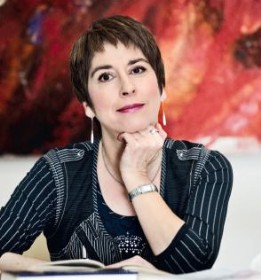
Rebecca Gablé (Wickrath, 25 september 1964)
De Chinese schrijver Lu Xun werd in 1881 in Shaoxing in de provincie Zhejiang geboren als Zhou Shuren. Zie ook alle tags voor Lu Xun op dit blog en ook mijn blog van 25 september 2009 en ook mijn blog van 25 september 2010
Uit: Kong Yiji
"Since then, I spend all day at the counter, doing my specialized job where I couldn’t make any blunders. The thing that bothered me most was that the job was so monotonous and boring. The tavern keeper always glared at me with a fierce face, and the customers were not friendly either. Therefore, I couldn’t slack off even a little bit, except for a few laughs that Kong Yiji brought to us every time he came to the wine tavern. That’s why I can still remember him.
Kong Yiji was the only one who stood drinking while wearing a robe. He was big and tall, yet he had a wan face, often with bruises showing in his wrinkles, and had a bedraggled grizzly beard. Although he wore a robe, the robe, which was well worn out, seemed not to have been mended nor washed for a decade. He used many obscure words and archaic phrases when he spoke that his speech was unintelligible. Because of his surname Kong, someone picked a nonsensical phrase “Shang Da Ren Kong Yi Ji” from the children’s practice book and used this as a nickname for him, “Kong Yiji.”. Each time, the moment he stepped into the tavern, all the customers would look at him and start laughing. Someone would yell: “Kong Yiji, you got a new scar on your face!” He never answered them, he only spoke to the waiter behind the counter: ‘Two bowls of wine heated and a dish of anise beans.’ He then spread out 9 coppers. The customers then intentionally raised their voices: ”You must have stolen something again.” Kong Yiji with his eyes wide open: ”How can you accuse me, an innocent person without any basis?……” “What kind of innocent person? …I saw with my own eyes that you stole the books from the Hes’ and you were hung up and beaten.” Kong Yiji’s face turned red and the veins on his forehead protruded, while defending himself, said: “Stealing books is not a theft, stealing books…is an intellectuals’ business, it’s not a theft! ” Following that he blurted out those archaic phrases, such as “a nobleman sticks to his principles despite poverty” so on and so forth. The crowd would burst into laughter; and the wine tavern once again became lively and rowdy."
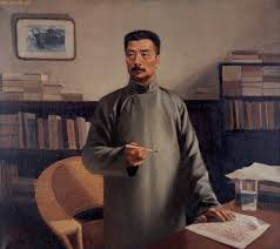
Lu Xun (25 september 1881 – 19 oktober 1936)
De Zweedse schrijfster Maj Sjöwall werd op 25 september 1935 in Stockholm geboren.Zie ook alle tags voor Maj Sjöwall op dit blog en ook mijn blog van 25 september 2010.
Uit: Roseanna (Samen met Per Wahlöö)
"But the Civil Engineering Board found that the Shipping and Navigation Administration had control over bucket dredging machines and in desperation made and appeal to the Harbor Commission in Norrkoping which immediately returned the papers to the Shipping and Navigation Administration, which remitted them to the Civil Engineering Board at which point someone picked up the telephone and dialed an engineer who knew all about bucket dredging machines. He knew that of the five existing bucket dredgers, there was only one that could pass through the locks. The vessel was called The Pig and happened just then to be lying in the fishing harbor at Gravarne. On the morning of July 5 The Pig arrived and moored at Borenshult as the neighborhood children and a Vietnamese tourist looked on.One hour later a representative of the Canal Company went on board to discuss the project. That took the whole afternoon. The next day was Saturday and vessel remained by the breakwater while the men went home for the weekend. The crew consisted of a dredging foreman, who was also the officer in command wit the authority to take the vessel to sea, an excavating engineer, and a deck man. The latter two men were from Gothenburg and took the night train from Motala. The skipper lived in Nacka and his wife came go get him in their car. At seven o'clock on Monday morning all three were pm board again and one hour later they began to dredge. By eleven o'clock the hold was full later they began to dredge. By eleven o'clcock the hold was full and the dredger went out into the lake to dump. On the way back they had to lay off and wait while a white steamboat approached the Boren locks in a westerly direction. Foreign tourists crowded along the vessel's railing and waved excitedly at the working crew on the dredger.
The passenger boat was elevated slowly up the locks toward Motala and lake Vottern and by lunch time its top pennant had disappeared in back of the uppermost sluice gat. At one-thirty the men began to dredge again.The situation was this: the weather was warm and beautiful with mild temperature winds and idly moving summer clouds. There were some people on the breakwater and on the edge of the canal. Most of them were sunning themselves, a few were fishing, and two or three were watching the dredging activity. The dredger's bucket had just gobbled up out of the water. The excavating engineer was operating the familiar handgrips in his cabin. The dredging foreman was having a cup of coffee in the galley, and the deck man stood with his having elbows on the railing and spit in the water."
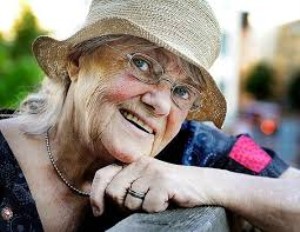
Maj Sjöwall (Stockholm, 25 september 1935)
De Duitse schrijver August Kühn (alias Helmut Munch), werd geboren op 25 sep 1936 in München. Zie ook alle tags voor August Kühn op dit blog en ook mijn blog van 25 september 2010
Uit: Zeit zum Aufstehn
"Die Sozialdemokratie wird auch dort sein, wie im vergangenen Jahre. – Ist euch schon aufgefallen, dass sich diese Maifeier, abgesehen von den Ansprachen der Referenten, in nichts von einem Familienausflug eines Kegelvereins unterscheidet?« Löffler wartete gar nicht erst ab, was die anderen dazu sagten. Er hatte seine Idee, die sollten sie gut finden, dann verging ihnen das Gerede vom Streik. »Erst wird doch gesoffen und dann gesungen, was sag ich, geplärrt, dass es eine Schande ist.«
»Arbeiterlieder!«, wagte Anderl Warz einzuwenden.
»Ja, Arbeiterlieder, doch warum werden die nicht schön gesungen, kunstvoll?« Nun bekam er keine Gegenrede mehr und konnte losziehen.
»Wenn jemand, der nicht zu uns gehört, vorbeikommt und sich das anhört, muss er uns für eine Räuberbande halten. Herwegh, Freiligrath, das waren Künstler. Ihre Lieder kann man nicht einfach so herausgrölen.«
»Mir reicht es schon, wenn alle den Text können«, rutschte es Gustl Kühn heraus und löste damit ein Gelächter aus, das Löffler mit bestimmter Handbewegung schnell wegwischte.
»Richtig singen kann man lernen! Schaut euch die Gesangvereine an.«
»Am Brunnen vor dem Tore...«, alberte Fritz und bekam dafür einen zornigen Blick des Postschaffners.
»Warum nicht? Sollen wir vielleicht auf alles verzichten, was es sonst an Liedern gibt? – Aber wenn ihr nicht wollt, ich hätte was gewusst...« – So muss man es machen, nun waren alle ganz Ohr, keine Einwände mehr. »Natürlich kann keiner erwarten, dass diese bürgerlichen Liedertafeln jetzt anfangen, unsere Lieder zu singen, nicht einmal aufnehmen würde uns so ein Verein. Gründen wir doch einen eigenen! Arbeitergesangverein München West, wie wäre das?«
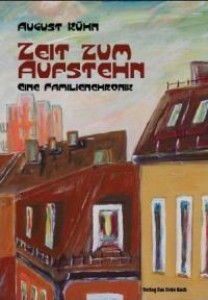
August Kühn (25 sep 1936 – 9 februari 1996)
Cover
De Iraanse dichter, schrijver en journalist Manouchehr Atashi werd geboren op 25 september 1931 in Dashtestan, in de provincie Bushehr. Zie ook alle tags voor Manouchehr Atashi op dit blog en ook mijn blog van 25 september 2010.
The Moon and the Poet
I hung myself to the moon like water,
I hung myself to the moon.
With the moon I mix through water,
And the fishes of my eyes from every direction,
And the fishes of my eyes I let swim from every direction towards him,
And twist
The green nets of my gaze around it,
(I seek the moon,
I mix with the moon from sleep
And with the rope of my sigh
I reduce its height);
But
The moon
Passes over my body,
From water I sleep at the mountain feet,
From my slumbering childhood and youth;
From moments and hours,
From days, nights and years
(From years which have passed away in darkness and frightful
Without laying any bright mark
from myself
- In their sandy plain.

Manouchehr Atashi (25 september 1931 - 20 november 2005)
De Engelse schrijver en criticus William Michael Rossetti werd geboren in Londen op 25 september 1829. Zie ook alle tags voor William Michael Rossetti op dit blog en ook mijn blog van 25 september 2009 en ook mijn blog van 25 september 2010
Jesus Wept
Mary rose up, as one in sleep might rise,
And went to meet her brother's Friend: and they
Who tarried with her said: 'she goes to pray
And weep where her dead brother's body lies.'
So, with their wringing of hands and with sighs,
They stood before Him in the public way.
'Had'st Thou been with him, Lord, upon that day,
He had not died,' she said, drooping her eyes.
Mary and Martha with bowed faces kept
Holding His garments, one on each side.--'Where
Have ye laid him?' He asked. 'Lord, come and see.'
The sound of grieving voices heavily
And universally was round Him there,
A sound that smote His spirit. Jesus wept.
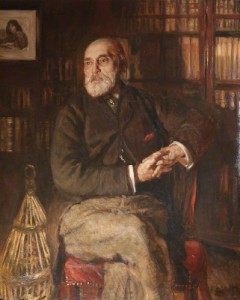
William Michael Rossetti (25 september 1829 - 5 februari 1919)
Portret door Herbert Harlakenden Gilchrist, 1899
De Ierse schrijver Charles Robert Maturin werd geboren in Dublin op 25 september 1782. Zie ook alle tags voor Charles Robert Maturin op dit blog mijn blog van 25 september 2010
Uit: Melmoth the Wanderer
"Then his college life, passed in an attic in the second square, uncheered by an invitation to the country; the gloomy summer wasted in walking up and down the deserted streets, as his uncle would not defray the expences of his journey;–the only intimation of his existence, received in quarterly epistles, containing, with the scanty but punctual remittance, complaints of the expences of his education, cautions against extravagance, and lamentations for the failure of tenants and the fall of the value of lands. All these recollections came over him, and along with them the remembrance of that last scene, where his dependence on his uncle was impressed on him by the dying lips of his father.
'John, I must leave you, my poor boy; it has pleased God to take your father from you before he could do for you what would have made this hour less painful to him. You must look up, John, to your uncle for every thing. He has oddities and infirmities, but you must learn to bear with them, and with many other things too, as you will learn too soon. And now, my poor boy, may He who is the father of the fatherless look on your desolate state, and give you favour in the eyes of your uncle.' As this scene rose to John's memory, his eyes filled fast with tears, which he hastened to wipe away as the carriage stopt to let him out at his uncle's gate.
He alighted, and with a change of linen in a handkerchief, (his only travelling equipment), he approached his uncle's gate. The lodge was in ruins, and a barefooted boy from an adjacent cabin ran to lift on its single hinge what had once been a gate, but was now a few planks so villainously put together, that they clattered like a sign in a high wind. The stubborn post of the gate, yielding at last to the united strength of John and his barefooted assistant, grated heavily through the mud and gravel stones, in which it left a deep and sloughy furrow, and the entrance lay open."
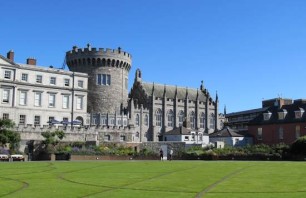
Charles Robert Maturin (25 september 1782 – 30 oktober 1824)
Dublin castle
De Duitse dichter, schrijver en literatuurwetenschapper Herbert Heckmann werd geboren op 25 september 1930 in Frankfurt am Main. Zie ook alle tags voor Herbert Heckmann op dit blog en ook mijn blog van 25 september 2009 en ook mijn blog van 25 september 2010
Uit: Die Trauer meines Großvaters
"Der Garten meiner Großmutter, der sich hinter dem Haus treppenartig bis zur Mauer an der Weidenbornstra-Re erstreckte, wurde vom Sommer bis zum Herbst vom unbeschreiblichen Blau des Rittersporns beherrscht. Onkel Peter nahm die Paraden der Stauden ab, and es kam schon einmal vor, dass er, den Blick in das Blau gerichtet, über die Einfassung eines Beetes stolperte und zwischen die Blumen sturzte. Fur die Romantiker ist die Wirklichkeit stets eine tackische Wildnis. Onkel Peter war ein unverbesserlicher Romantiker und überließ seine Gedanken einer besseren Zukunft. Vater lebte fur den Augenblick. Wenn wir zur Blutezeit des Rittersporns bei meiner Großmutter in der Oberhainer Straße zu Besuch waren, schnitt er, kurz bevor wir wieder aufbrachen, einige Rispen ab und band sie zu einem Strauß Schon in der StraßSenbahn begann der Herbst, und die Blumen rieselten zu Boden. Am nachsten Morgen war die Vase auf unserem Wohnzimmertisch von verblassten Ritterspornbluten umsaumt, und die nackten Rispen drohten wie Finger. Onkel Peter nannte meinen Vater einen Blumenmorder, was dieser Oberhaupt nicht gerne hörte. Er wehrte sich mit der Behauptung, alle Schonheit sei vergänglich und man musse sie genießen, wenn sie sich gerade frisch entfalte. ich versuchte mir vorzustellen, wie alles, was ich liebe, verging und verschwand. Es wurde mir schwindelig bei dem Gedanken."
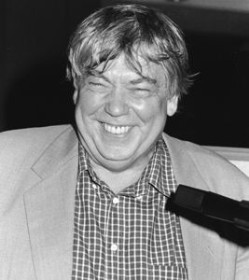
Herbert Heckmann (25 september 1930 – 18 oktober 1999)
|



